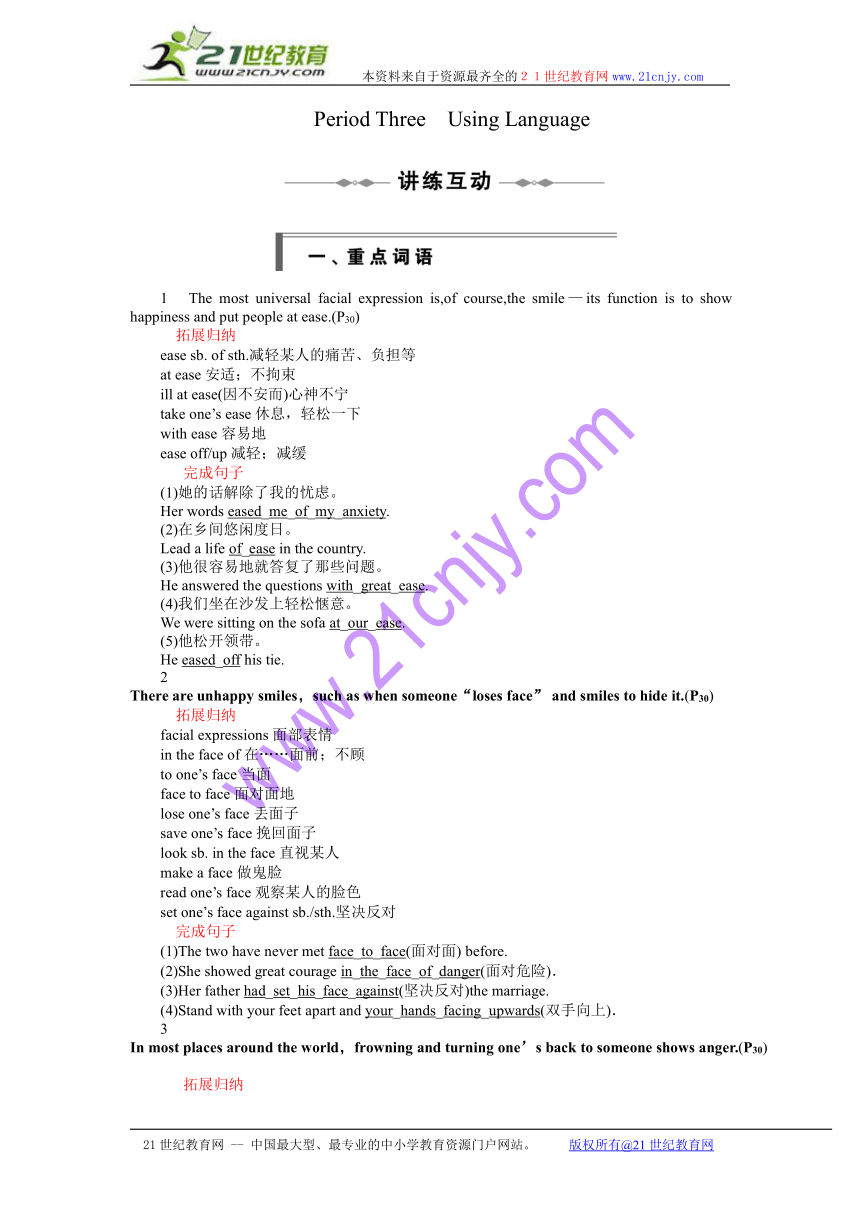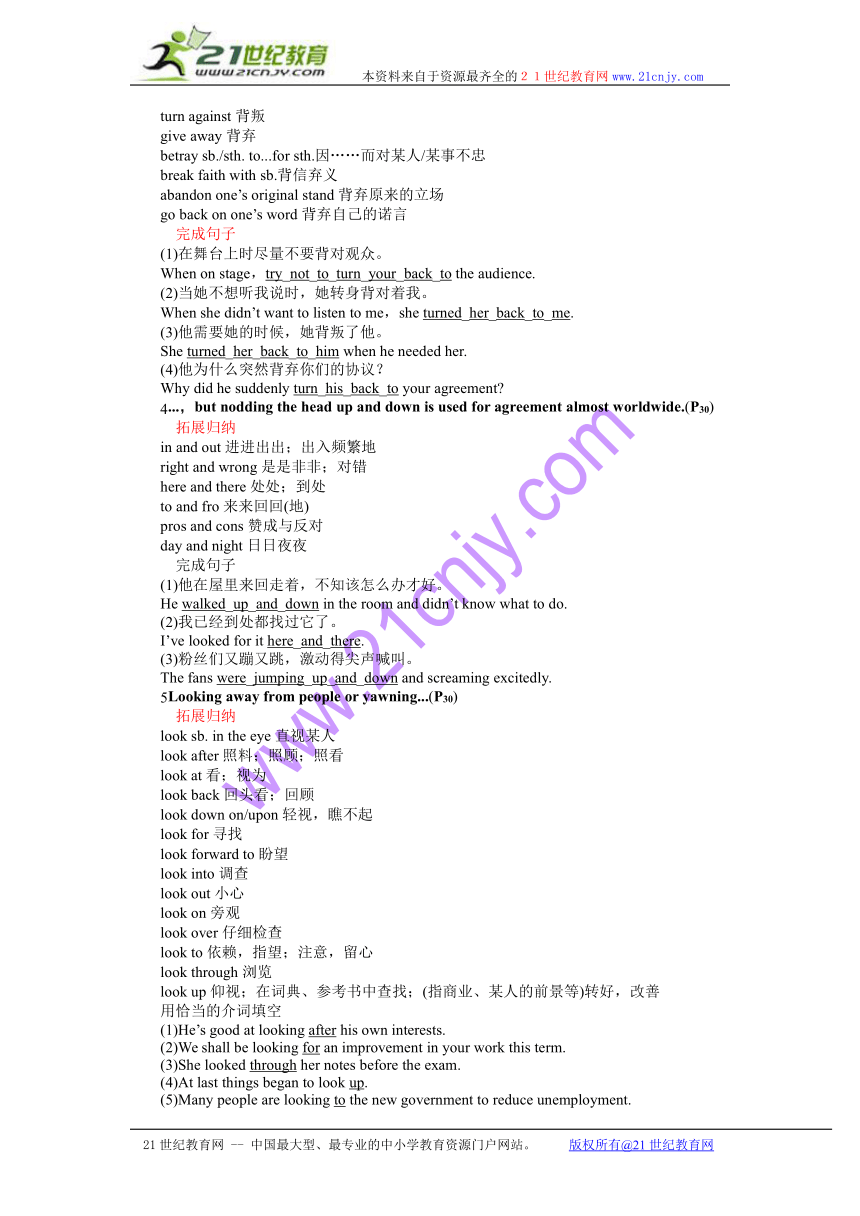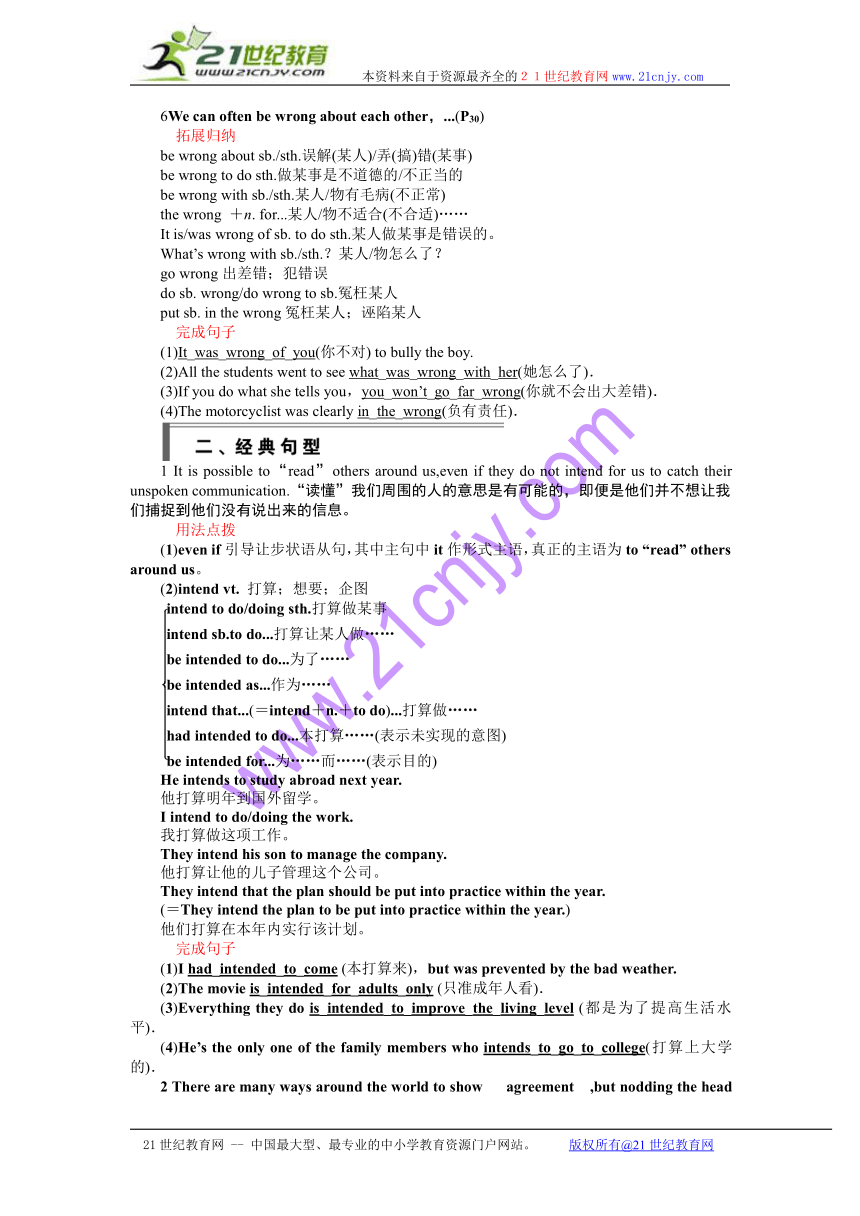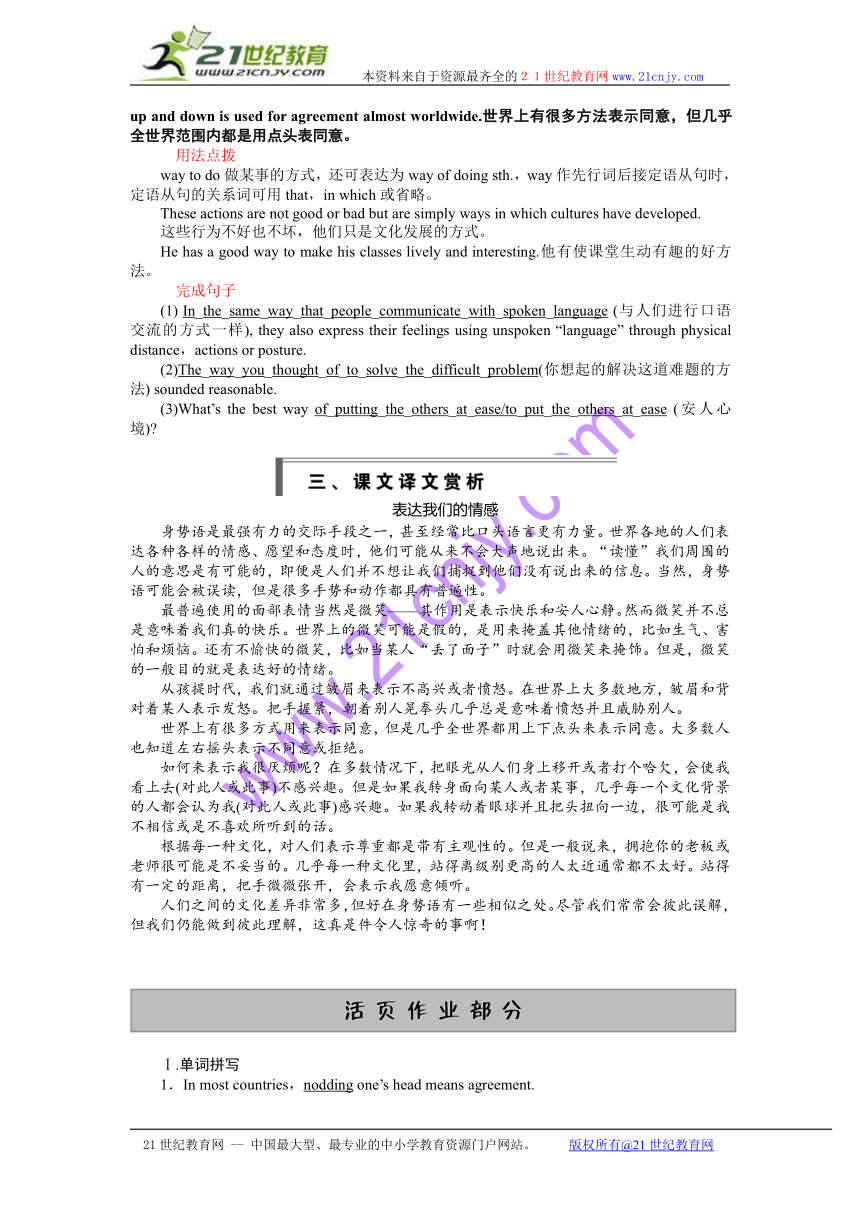Unit 4 Body language - Using Language同步学案
文档属性
| 名称 | Unit 4 Body language - Using Language同步学案 |  | |
| 格式 | rar | ||
| 文件大小 | 133.9KB | ||
| 资源类型 | 教案 | ||
| 版本资源 | 人教版(新课程标准) | ||
| 科目 | 英语 | ||
| 更新时间 | 2011-03-16 08:58:00 | ||
图片预览




文档简介
本资料来自于资源最齐全的21世纪教育网www.21cnjy.com
Period Three Using Language
1 The most universal facial expression is,of course,the smile—its function is to show happiness and put people at ease.(P30)
?拓展归纳
ease sb. of sth.减轻某人的痛苦、负担等
at ease安适;不拘束
ill at ease(因不安而)心神不宁
take one’s ease休息,轻松一下
with ease容易地
ease off/up减轻;减缓
?完成句子
(1)她的话解除了我的忧虑。
Her words eased_me_of_my_anxiety.
(2)在乡间悠闲度日。
Lead a life of_ease in the country.
(3)他很容易地就答复了那些问题。
He answered the questions with_great_ease.
(4)我们坐在沙发上轻松惬意。
We were sitting on the sofa at_our_ease.
(5)他松开领带。
He eased_off his tie.
2
?拓展归纳
facial expressions面部表情
in the face of在……面前;不顾
to one’s face当面
face to face面对面地
lose one’s face丢面子
save one’s face挽回面子
look sb. in the face直视某人
make a face做鬼脸
read one’s face观察某人的脸色
set one’s face against sb./sth.坚决反对
?完成句子
(1)The two have never met face_to_face(面对面) before.
(2)She showed great courage in_the_face_of_danger(面对危险).
(3)Her father had_set_his_face_against(坚决反对)the marriage.
(4)Stand with your feet apart and your_hands_facing_upwards(双手向上).
3
?拓展归纳
turn against背叛
give away背弃
betray sb./sth. to...for sth.因……而对某人/某事不忠
break faith with sb.背信弃义
abandon one’s original stand背弃原来的立场
go back on one’s word背弃自己的诺言
?完成句子
(1)在舞台上时尽量不要背对观众。
When on stage,try_not_to_turn_your_back_to the audience.
(2)当她不想听我说时,她转身背对着我。
When she didn’t want to listen to me,she turned_her_back_to_me.
(3)他需要她的时候,她背叛了他。
She turned_her_back_to_him when he needed her.
(4)他为什么突然背弃你们的协议?
Why did he suddenly turn_his_back_to your agreement
4
?拓展归纳
in and out进进出出;出入频繁地
right and wrong是是非非;对错
here and there处处;到处
to and fro来来回回(地)
pros and cons赞成与反对
day and night日日夜夜
?完成句子
(1)他在屋里来回走着,不知该怎么办才好。
He walked_up_and_down in the room and didn’t know what to do.
(2)我已经到处都找过它了。
I’ve looked for it here_and_there.
(3)粉丝们又蹦又跳,激动得尖声喊叫。
The fans were_jumping_up_and_down and screaming excitedly.
5
?拓展归纳
look sb. in the eye直视某人
look after照料;照顾;照看
look at看;视为
look back回头看;回顾
look down on/upon轻视,瞧不起
look for寻找
look forward to盼望
look into调查
look out小心
look on旁观
look over仔细检查
look to依赖,指望;注意,留心
look through浏览
look up仰视;在词典、参考书中查找;(指商业、某人的前景等)转好,改善
用恰当的介词填空
(1)He’s good at looking after his own interests.
(2)We shall be looking for an improvement in your work this term.
(3)She looked through her notes before the exam.
(4)At last things began to look up.
(5)Many people are looking to the new government to reduce unemployment.
6We can often be wrong about each other,...(P30)
?拓展归纳
be wrong about sb./sth.误解(某人)/弄(搞)错(某事)
be wrong to do sth.做某事是不道德的/不正当的
be wrong with sb./sth.某人/物有毛病(不正常)
the wrong +n. for...某人/物不适合(不合适)……
It is/was wrong of sb. to do sth.某人做某事是错误的。
What’s wrong with sb./sth.?某人/物怎么了?
go wrong出差错;犯错误
do sb. wrong/do wrong to sb.冤枉某人
put sb. in the wrong冤枉某人;诬陷某人
?完成句子
(1)It_was_wrong_of_you(你不对) to bully the boy.
(2)All the students went to see what_was_wrong_with_her(她怎么了).
(3)If you do what she tells you,you_won’t_go_far_wrong(你就不会出大差错).
(4)The motorcyclist was clearly in_the_wrong(负有责任).
1 It is possible to“read”others around us,even if they do not intend for us to catch their unspoken communication.“读懂”我们周围的人的意思是有可能的,即便是他们并不想让我们捕捉到他们没有说出来的信息。
?用法点拨
(1)even if引导让步状语从句,其中主句中it作形式主语,真正的主语为to “read” others around us。
(2)intend vt. 打算;想要;企图
He intends to study abroad next year.
他打算明年到国外留学。
I intend to do/doing the work.
我打算做这项工作。
They intend his son to manage the company.
他打算让他的儿子管理这个公司。
They intend that the plan should be put into practice within the year.
(=They intend the plan to be put into practice within the year.)
他们打算在本年内实行该计划。
?完成句子
(1)I had_intended_to_come (本打算来),but was prevented by the bad weather.
(2)The movie is_intended_for_adults_only (只准成年人看).
(3)Everything they do is_intended_to_improve_the_living_level (都是为了提高生活水平).
(4)He’s the only one of the family members who intends_to_go_to_college(打算上大学的).
2 There are many ways around the world to show ?agreement?,but nodding the head up and down is used for agreement almost worldwide.世界上有很多方法表示同意,但几乎全世界范围内都是用点头表同意。
?用法点拨
way to do做某事的方式,还可表达为way of doing sth.,way作先行词后接定语从句时,定语从句的关系词可用that,in which或省略。
These actions are not good or bad but are simply ways in which cultures have developed.
这些行为不好也不坏,他们只是文化发展的方式。
He has a good way to make his classes lively and interesting.他有使课堂生动有趣的好方法。
?完成句子
(1) In_the_same_way_that_people_communicate_with_spoken_language (与人们进行口语交流的方式一样), they also express their feelings using unspoken “language” through physical distance,actions or posture.
(2)The_way_you_thought_of_to_solve_the_difficult_problem(你想起的解决这道难题的方法) sounded reasonable.
(3)What’s the best way of_putting_the_others_at_ease/to_put_the_others_at_ease (安人心境)
表达我们的情感
身势语是最强有力的交际手段之一,甚至经常比口头语言更有力量。世界各地的人们表达各种各样的情感、愿望和态度时,他们可能从来不会大声地说出来。“读懂”我们周围的人的意思是有可能的,即便是人们并不想让我们捕捉到他们没有说出来的信息。当然,身势语可能会被误读,但是很多手势和动作都具有普遍性。
最普遍使用的面部表情当然是微笑——其作用是表示快乐和安人心静。然而微笑并不总是意味着我们真的快乐。世界上的微笑可能是假的,是用来掩盖其他情绪的,比如生气、害怕和烦恼。还有不愉快的微笑,比如当某人“丢了面子”时就会用微笑来掩饰。但是,微笑的一般目的就是表达好的情绪。
从孩提时代,我们就通过皱眉来表示不高兴或者愤怒。在世界上大多数地方,皱眉和背对着某人表示发怒。把手握紧,朝着别人晃拳头几乎总是意味着愤怒并且威胁别人。
世界上有很多方式用来表示同意,但是几乎全世界都用上下点头来表示同意。大多数人也知道左右摇头表示不同意或拒绝。
如何来表示我很厌烦呢?在多数情况下,把眼光从人们身上移开或者打个哈欠,会使我看上去(对此人或此事)不感兴趣。但是如果我转身面向某人或者某事,几乎每一个文化背景的人都会认为我(对此人或此事)感兴趣。如果我转动着眼球并且把头扭向一边,很可能是我不相信或是不喜欢所听到的话。
根据每一种文化,对人们表示尊重都是带有主观性的。但是一般说来,拥抱你的老板或老师很可能是不妥当的。几乎每一种文化里,站得离级别更高的人太近通常都不太好。站得有一定的距离,把手微微张开,会表示我愿意倾听。
人们之间的文化差异非常多,但好在身势语有一些相似之处。尽管我们常常会彼此误解,
但我们仍能做到彼此理解,这真是件令人惊奇的事啊!
Ⅰ.单词拼写
1.In most countries,nodding one’s head means agreement.
2.When you’re in a foreign country,it is important for you to follow the customs of the country you’re visiting.
3.What does the star represent (代表) before the question
4.The major (主要的) subjects in senior high schools are Chinese,English and mathematics.
5.I introduced my friends to my parents one by one at my birthday party.
6.As you approach (接近) the town,the first building you see is the church.
7.While riding my way home,I just avoided (避免) running over the cat.
8.We have similar tastes in music.
9.He was curious about everything he saw and kept asking questions.
10.In some countries,a visitor will be greeted with a kiss on the cheek.
Ⅱ.词语填空
take action,approach,punish...for,up and down,watch out,be wrong about,make notes of,represent,put...at ease,look away from
1.To our great joy,Shen Guofang will represent our government to give a talk at the
Congress.
2.She got very nervous because the final exam is approaching.
3.The teacher punished him for cheating in the exam.
4.While listening to the lectures,she made_notes_of the important points.
5.The facts proved that we were_wrong_about him,so we all apologized to him.
6.You’d better watch_out for traffic while crossing the road.
7.He walked up_and_down in the room and didn’t know what he should do with the matter.
8.We must take_action before it is too late.
9.He is a little nervous.Give him a cup of tea to put_him_at_ease.
10.Don’t look_away_from me when I’m speaking to you.
Ⅲ.完成句子
1.Mr.Smith_coming_from_Canada(来自加拿大的史密斯先生) is interested in the_development_of_business_in_Shanghai(上海的商务发展).
2.His assistants closely_followed_Mr.Smith_into(紧跟着史密斯先生走进) the meeting room.
3.Mr.Garcia approached Ms.Smith,touched_her_on_the_shoulder_and_kissed_her_on
_the_cheek(摸了摸她的肩,亲了亲她的脸).
4.English people usually shake_hands_with_him(同他握手) when they meet a friend.
5.Men from Middle East or some Muslim countries often_stand_quite_close_to_other_
men_to_talk(在谈话时通常站在离别的男士很近的地方) but will_not_shake_hands_with
_women(不会同女士握手).
6.In China nodding_the_head_up_and_down_shows_agreement(上下点头表示同意).
7.It is not polite moving_your_eyes_away_from_a_person (把眼光从某人身上移开) when you are having a talk with him.
8.We should pay_attention_to_the_difference_of_body_language(注意身势语的差异).
Ⅳ.翻译句子
1.他想知道办公室里正发生什么事。
He_was_curious_to_know_what_was_happening_in_the_office.
2.我那时不想和你失去联系,但我不知道怎样和你取得联系。
At_that_time_I_didn’t_want_to_lose_touch_with_you,but_I_didn’t_know_how_to_get_in_touch_with_you.
3.风景美得无法形容。
The_scenery_was_beautiful_beyond_expression./The_beauty_of_the_scenery_was_beyond_expression.
4.佛教是公元67年传入中国的。
Buddhism_was_introduced_to_China_in_67AD.
5.卫生保健是当代一个主要问题之一。
Health_care_is_one_of_the_major_problems_of_our_time.
6.我和我的朋友在音乐方面有相似的爱好。
My_friend_and_I_have_the_similar_hobby_in_music.
7.他用手指做了一个粗鲁的手势。
He_made_a_rude_gesture_with_his_fingers.
8.靠近学校附近有一个公共汽车站。
There_is_a_bus_stop_close_to_the_school.
9.他一到伦敦就去看他的老朋友。
On_his_arrival_in_London,he_went_to_see_his_old_friend.
10.一些专家已经被派到那里去为台湾挑选最好的熊猫。
Some_experts_have_been_sent_there_to_help_pick_out_the_best_pandas_for_Taiwan.
Ⅴ.单项填空
1.The agreement they have ________ will make both favorable.
A.reached B.arrived C.got D.taken
答案 A
解析 reach an agreement 达成协议;arrive是不及物动词,get,take 都不与 agreement 搭配使用。
2.At the same time they are taking strong ________ to protect wildlife resources.
A.actions B.measures C.step D.efforts
答案 B
解析 take measures 采取措施,其另外的表达方式应为 take action 或 take steps。
3.The customer bargained with the shopkeeper for a long time,and finally they agreed ________ the price.
A.to B.with C.on D.at
答案 C
解析 agree on 就……达成一致意见;agree with+某人或表示“意见,看法”的词;agree to+表示“提议,办法,计划”的词。
4.Thirty years after being ________ to Macaulay’s words,they still seem to me the best yardstick.
A.referred B.show C.brought D.introduced
答案 D
解析 introduce sb. to sth.使某人体验……;使某人接触……。refer to...,与本题不符。
5.I have a ________ idea of how a car works.
A.common B.general C.usual D.ordinary
答案 B
解析 common 常见的,普通的;genera 大体上的,总体上的;usual 通常;ordinary 平常的。
6.Snow announced the ________ of winter.
A.attitude B.approach C.viewpoint D.principle
答案 B
解析 attitude 态度;approach 临近,此处是名词;viewpoint 观点,看法;principle 原则,定理。
7.Some students like staying up late into the night,________ their lessons for the coming examination.
A.to prepare B.preparing C.prepare D.was preparing
答案 B
解析 根据句意及句子结构,这里应该用现在分词 preparing 表伴随。
8.The little boy sat ________ to his father,and listened ________ with great interest.
A.close;close B.closely;close C.close;closely D.closely;closely
答案 C
解析 sit close to... 坐的离……近;listen closely 仔细地听;close,closely 在这里都是 adv.,但 close 指的是实际距离近,closely 指抽象意义上的近。
9.The girl is similar ________ her mother in character.
A.in B.with C.to D.on
答案 C
解析 be similar to...与……相似;be similar in...在……方面相近/似。
10.Did you notice the ________ on the leader’s face when he heard twenty three countries couldn’t get enough rice in Africa
A.appearance B.description C.expression D.attitude
答案 C
11.—Some persons can be dancers,but some not.
—________ man can be a dancer.
A.Every B.Each C.Not each D.Not every
答案 D
解析 考查部分否定。
12.She stood there ________ a stick ________ her.
A.with;supported B.by;supporting
C.with;supporting D.by;supported
答案 C
解析 考查“with+宾语+宾语补足语”结构。
13.A middle aged woman came ________ to the bus stop only ________ the bus had gone.
A.to run;to find B.running;to find
C.and ran;finding D.running;finding
答案 B
解析 come后接running表示方式;only后接动词不定式表示与主语所预料的结果相反,而only后接分词则表示伴随动作,指偶然得到的信息。
14.—Which materials can be thrown into the sea ________ on the nature of them
—Sorry,I have no idea.
A.depends B.depended C.depending D.to depend
答案 C
解析 “Which materials can be thrown into the sea”是主句,depending on...作状语。如果把问号改为句号,“Which materials can be thrown into the sea”就是名词性从句作主语了,那么答案就应选A项。
15.Solar power is power ________ energy from the sun.
A.producing used B.produced using
C.produces using D.produced used
答案 B
解析 句意为:太阳能是(人们)用来自太阳的能量而产生的能源。表语power应该是“被产生”的,所以后面的定语得用过去分词,且空后的energy作use的宾语,不含有被动的含义,不能用used,而应用using。
Ⅵ.短文改错
Dear Sir/Madam,
I’m middle school student of sixteen.I have a weight problem.Some boys often fun of me and are unfriendly me.They call me “Meat ball”, makes me feel .I’m now worried about my weight.Although I am a bit fat, I feel quite well.I enjoy my meals.I love eating meat very much. I like sweet , too.Now I am getting fatter and fatter.In the past two months, I have put on 5 kilos.I’ve worrying about this, but I don’t know that\ how to lose weight quickly.Who can tell me the right way of weight
If you give me some advice, I’ll be grateful.
Yours,
Li Ming
Ⅶ.书面表达
根据下列提示,写一篇英语作文。
从国外回来的人说,西方人比中国人说“对不起”要多得多。中国人在做错了事或伤害了别人后才道歉,而西方人想从你前面走过去,聚会时中途离开,约会(appointment)迟到,都要说声“对不起”。他们也常说“谢谢”,甚至在家里妻子给丈夫倒了一杯水,丈夫也不忘说“谢谢”。说“谢谢”表示你感激别人为你做的事,不管这事有多小。“谢谢”“对不起”是西方人最平常的用语,这样的用语对于相处融洽、增加亲切感大有益处。
注意:词数100左右。
参考范文
Western people say “Excuse me” more often than we Chinese.In China,“Excuse me” is only used to apologize when a person has done something wrong or has hurt someone else.Western people say it when they want to pass in front of someone,to leave the party,or when they find themselves late for an appointment.They also say “Thank you” more readily.Even at home the husband will thank the wife when she gives him a glass of water.“Thank you” means you appreciate what someone has done for you,no matter how small it may be.“Excuse me” and “Thank you” are the most ordinary words Western people use every day.These words can help
people get along well with each other and add to some warm feelings between people.
You have no idea how she finished the relay race________her foot wounded so much.(福建高考)
A.for B.when C.with D.while
答案 C
解析 此处是with+复合宾语结构。其余三项为连词,后接句子,如用它们,wounded前应加was。
课文原文
With_so_many_cultural_differences_between_people,it is great to have some similarities in body language.
—May I ask a question after class,Sir
—________,but not during my lunch break.(重庆高考)
A.I’m sorry B.Anytime C.Certainly D.Go ahead
答案 C
解析 应先对May I ask...?进行作答,然后又有限制,因此应用certainly。
课文原文
In general,though,studying international customs can certainly help avoid difficulties in today’s world of cultural crossroads.
Michael’s new house is like a huge palace,________ with his old one.(重庆高考)
A.comparing B.compares C.to compare D.compared
答案 D
解析 句意为:迈克尔的新房子和老房子比起来简直像一座大宫殿。由句意知,把新房子拿来和老房子作比较,故应用被动形式,此处为过去分词作状语。
课文原文
Being respectful to people is subjective,based_on_each_culture,...
The telephone__________,but by the time I got indoors,it stopped.(四川高考)
A.had rung B.was ringing C.rings D.has rung
答案 B
解析 由句意“电话响着,但我进入室内时停了”可知,该题表达的时间与过去有关,而与现在无关。由此,排除C、D两项。而如果选A项,则与后面it stopped在逻辑上存在错误。
课文原文
They were_coming to study at Beijing University.
We are invited to a party ________ in our club next Friday.(山东高考)
A.to be held B.held C.being held D.holding
答案 A
解析 party和hold之间是被动关系,由句中的时间状语next Friday可知应用表示将来的不定式短语to be held作后置定语。
课文原文
The first person to_arrive was Tony Garcia from Colombia,...
21世纪教育网 -- 中国最大型、最专业的中小学教育资源门户网站。 版权所有@21世纪教育网
Period Three Using Language
1 The most universal facial expression is,of course,the smile—its function is to show happiness and put people at ease.(P30)
?拓展归纳
ease sb. of sth.减轻某人的痛苦、负担等
at ease安适;不拘束
ill at ease(因不安而)心神不宁
take one’s ease休息,轻松一下
with ease容易地
ease off/up减轻;减缓
?完成句子
(1)她的话解除了我的忧虑。
Her words eased_me_of_my_anxiety.
(2)在乡间悠闲度日。
Lead a life of_ease in the country.
(3)他很容易地就答复了那些问题。
He answered the questions with_great_ease.
(4)我们坐在沙发上轻松惬意。
We were sitting on the sofa at_our_ease.
(5)他松开领带。
He eased_off his tie.
2
?拓展归纳
facial expressions面部表情
in the face of在……面前;不顾
to one’s face当面
face to face面对面地
lose one’s face丢面子
save one’s face挽回面子
look sb. in the face直视某人
make a face做鬼脸
read one’s face观察某人的脸色
set one’s face against sb./sth.坚决反对
?完成句子
(1)The two have never met face_to_face(面对面) before.
(2)She showed great courage in_the_face_of_danger(面对危险).
(3)Her father had_set_his_face_against(坚决反对)the marriage.
(4)Stand with your feet apart and your_hands_facing_upwards(双手向上).
3
?拓展归纳
turn against背叛
give away背弃
betray sb./sth. to...for sth.因……而对某人/某事不忠
break faith with sb.背信弃义
abandon one’s original stand背弃原来的立场
go back on one’s word背弃自己的诺言
?完成句子
(1)在舞台上时尽量不要背对观众。
When on stage,try_not_to_turn_your_back_to the audience.
(2)当她不想听我说时,她转身背对着我。
When she didn’t want to listen to me,she turned_her_back_to_me.
(3)他需要她的时候,她背叛了他。
She turned_her_back_to_him when he needed her.
(4)他为什么突然背弃你们的协议?
Why did he suddenly turn_his_back_to your agreement
4
?拓展归纳
in and out进进出出;出入频繁地
right and wrong是是非非;对错
here and there处处;到处
to and fro来来回回(地)
pros and cons赞成与反对
day and night日日夜夜
?完成句子
(1)他在屋里来回走着,不知该怎么办才好。
He walked_up_and_down in the room and didn’t know what to do.
(2)我已经到处都找过它了。
I’ve looked for it here_and_there.
(3)粉丝们又蹦又跳,激动得尖声喊叫。
The fans were_jumping_up_and_down and screaming excitedly.
5
?拓展归纳
look sb. in the eye直视某人
look after照料;照顾;照看
look at看;视为
look back回头看;回顾
look down on/upon轻视,瞧不起
look for寻找
look forward to盼望
look into调查
look out小心
look on旁观
look over仔细检查
look to依赖,指望;注意,留心
look through浏览
look up仰视;在词典、参考书中查找;(指商业、某人的前景等)转好,改善
用恰当的介词填空
(1)He’s good at looking after his own interests.
(2)We shall be looking for an improvement in your work this term.
(3)She looked through her notes before the exam.
(4)At last things began to look up.
(5)Many people are looking to the new government to reduce unemployment.
6We can often be wrong about each other,...(P30)
?拓展归纳
be wrong about sb./sth.误解(某人)/弄(搞)错(某事)
be wrong to do sth.做某事是不道德的/不正当的
be wrong with sb./sth.某人/物有毛病(不正常)
the wrong +n. for...某人/物不适合(不合适)……
It is/was wrong of sb. to do sth.某人做某事是错误的。
What’s wrong with sb./sth.?某人/物怎么了?
go wrong出差错;犯错误
do sb. wrong/do wrong to sb.冤枉某人
put sb. in the wrong冤枉某人;诬陷某人
?完成句子
(1)It_was_wrong_of_you(你不对) to bully the boy.
(2)All the students went to see what_was_wrong_with_her(她怎么了).
(3)If you do what she tells you,you_won’t_go_far_wrong(你就不会出大差错).
(4)The motorcyclist was clearly in_the_wrong(负有责任).
1 It is possible to“read”others around us,even if they do not intend for us to catch their unspoken communication.“读懂”我们周围的人的意思是有可能的,即便是他们并不想让我们捕捉到他们没有说出来的信息。
?用法点拨
(1)even if引导让步状语从句,其中主句中it作形式主语,真正的主语为to “read” others around us。
(2)intend vt. 打算;想要;企图
He intends to study abroad next year.
他打算明年到国外留学。
I intend to do/doing the work.
我打算做这项工作。
They intend his son to manage the company.
他打算让他的儿子管理这个公司。
They intend that the plan should be put into practice within the year.
(=They intend the plan to be put into practice within the year.)
他们打算在本年内实行该计划。
?完成句子
(1)I had_intended_to_come (本打算来),but was prevented by the bad weather.
(2)The movie is_intended_for_adults_only (只准成年人看).
(3)Everything they do is_intended_to_improve_the_living_level (都是为了提高生活水平).
(4)He’s the only one of the family members who intends_to_go_to_college(打算上大学的).
2 There are many ways around the world to show ?agreement?,but nodding the head up and down is used for agreement almost worldwide.世界上有很多方法表示同意,但几乎全世界范围内都是用点头表同意。
?用法点拨
way to do做某事的方式,还可表达为way of doing sth.,way作先行词后接定语从句时,定语从句的关系词可用that,in which或省略。
These actions are not good or bad but are simply ways in which cultures have developed.
这些行为不好也不坏,他们只是文化发展的方式。
He has a good way to make his classes lively and interesting.他有使课堂生动有趣的好方法。
?完成句子
(1) In_the_same_way_that_people_communicate_with_spoken_language (与人们进行口语交流的方式一样), they also express their feelings using unspoken “language” through physical distance,actions or posture.
(2)The_way_you_thought_of_to_solve_the_difficult_problem(你想起的解决这道难题的方法) sounded reasonable.
(3)What’s the best way of_putting_the_others_at_ease/to_put_the_others_at_ease (安人心境)
表达我们的情感
身势语是最强有力的交际手段之一,甚至经常比口头语言更有力量。世界各地的人们表达各种各样的情感、愿望和态度时,他们可能从来不会大声地说出来。“读懂”我们周围的人的意思是有可能的,即便是人们并不想让我们捕捉到他们没有说出来的信息。当然,身势语可能会被误读,但是很多手势和动作都具有普遍性。
最普遍使用的面部表情当然是微笑——其作用是表示快乐和安人心静。然而微笑并不总是意味着我们真的快乐。世界上的微笑可能是假的,是用来掩盖其他情绪的,比如生气、害怕和烦恼。还有不愉快的微笑,比如当某人“丢了面子”时就会用微笑来掩饰。但是,微笑的一般目的就是表达好的情绪。
从孩提时代,我们就通过皱眉来表示不高兴或者愤怒。在世界上大多数地方,皱眉和背对着某人表示发怒。把手握紧,朝着别人晃拳头几乎总是意味着愤怒并且威胁别人。
世界上有很多方式用来表示同意,但是几乎全世界都用上下点头来表示同意。大多数人也知道左右摇头表示不同意或拒绝。
如何来表示我很厌烦呢?在多数情况下,把眼光从人们身上移开或者打个哈欠,会使我看上去(对此人或此事)不感兴趣。但是如果我转身面向某人或者某事,几乎每一个文化背景的人都会认为我(对此人或此事)感兴趣。如果我转动着眼球并且把头扭向一边,很可能是我不相信或是不喜欢所听到的话。
根据每一种文化,对人们表示尊重都是带有主观性的。但是一般说来,拥抱你的老板或老师很可能是不妥当的。几乎每一种文化里,站得离级别更高的人太近通常都不太好。站得有一定的距离,把手微微张开,会表示我愿意倾听。
人们之间的文化差异非常多,但好在身势语有一些相似之处。尽管我们常常会彼此误解,
但我们仍能做到彼此理解,这真是件令人惊奇的事啊!
Ⅰ.单词拼写
1.In most countries,nodding one’s head means agreement.
2.When you’re in a foreign country,it is important for you to follow the customs of the country you’re visiting.
3.What does the star represent (代表) before the question
4.The major (主要的) subjects in senior high schools are Chinese,English and mathematics.
5.I introduced my friends to my parents one by one at my birthday party.
6.As you approach (接近) the town,the first building you see is the church.
7.While riding my way home,I just avoided (避免) running over the cat.
8.We have similar tastes in music.
9.He was curious about everything he saw and kept asking questions.
10.In some countries,a visitor will be greeted with a kiss on the cheek.
Ⅱ.词语填空
take action,approach,punish...for,up and down,watch out,be wrong about,make notes of,represent,put...at ease,look away from
1.To our great joy,Shen Guofang will represent our government to give a talk at the
Congress.
2.She got very nervous because the final exam is approaching.
3.The teacher punished him for cheating in the exam.
4.While listening to the lectures,she made_notes_of the important points.
5.The facts proved that we were_wrong_about him,so we all apologized to him.
6.You’d better watch_out for traffic while crossing the road.
7.He walked up_and_down in the room and didn’t know what he should do with the matter.
8.We must take_action before it is too late.
9.He is a little nervous.Give him a cup of tea to put_him_at_ease.
10.Don’t look_away_from me when I’m speaking to you.
Ⅲ.完成句子
1.Mr.Smith_coming_from_Canada(来自加拿大的史密斯先生) is interested in the_development_of_business_in_Shanghai(上海的商务发展).
2.His assistants closely_followed_Mr.Smith_into(紧跟着史密斯先生走进) the meeting room.
3.Mr.Garcia approached Ms.Smith,touched_her_on_the_shoulder_and_kissed_her_on
_the_cheek(摸了摸她的肩,亲了亲她的脸).
4.English people usually shake_hands_with_him(同他握手) when they meet a friend.
5.Men from Middle East or some Muslim countries often_stand_quite_close_to_other_
men_to_talk(在谈话时通常站在离别的男士很近的地方) but will_not_shake_hands_with
_women(不会同女士握手).
6.In China nodding_the_head_up_and_down_shows_agreement(上下点头表示同意).
7.It is not polite moving_your_eyes_away_from_a_person (把眼光从某人身上移开) when you are having a talk with him.
8.We should pay_attention_to_the_difference_of_body_language(注意身势语的差异).
Ⅳ.翻译句子
1.他想知道办公室里正发生什么事。
He_was_curious_to_know_what_was_happening_in_the_office.
2.我那时不想和你失去联系,但我不知道怎样和你取得联系。
At_that_time_I_didn’t_want_to_lose_touch_with_you,but_I_didn’t_know_how_to_get_in_touch_with_you.
3.风景美得无法形容。
The_scenery_was_beautiful_beyond_expression./The_beauty_of_the_scenery_was_beyond_expression.
4.佛教是公元67年传入中国的。
Buddhism_was_introduced_to_China_in_67AD.
5.卫生保健是当代一个主要问题之一。
Health_care_is_one_of_the_major_problems_of_our_time.
6.我和我的朋友在音乐方面有相似的爱好。
My_friend_and_I_have_the_similar_hobby_in_music.
7.他用手指做了一个粗鲁的手势。
He_made_a_rude_gesture_with_his_fingers.
8.靠近学校附近有一个公共汽车站。
There_is_a_bus_stop_close_to_the_school.
9.他一到伦敦就去看他的老朋友。
On_his_arrival_in_London,he_went_to_see_his_old_friend.
10.一些专家已经被派到那里去为台湾挑选最好的熊猫。
Some_experts_have_been_sent_there_to_help_pick_out_the_best_pandas_for_Taiwan.
Ⅴ.单项填空
1.The agreement they have ________ will make both favorable.
A.reached B.arrived C.got D.taken
答案 A
解析 reach an agreement 达成协议;arrive是不及物动词,get,take 都不与 agreement 搭配使用。
2.At the same time they are taking strong ________ to protect wildlife resources.
A.actions B.measures C.step D.efforts
答案 B
解析 take measures 采取措施,其另外的表达方式应为 take action 或 take steps。
3.The customer bargained with the shopkeeper for a long time,and finally they agreed ________ the price.
A.to B.with C.on D.at
答案 C
解析 agree on 就……达成一致意见;agree with+某人或表示“意见,看法”的词;agree to+表示“提议,办法,计划”的词。
4.Thirty years after being ________ to Macaulay’s words,they still seem to me the best yardstick.
A.referred B.show C.brought D.introduced
答案 D
解析 introduce sb. to sth.使某人体验……;使某人接触……。refer to...,与本题不符。
5.I have a ________ idea of how a car works.
A.common B.general C.usual D.ordinary
答案 B
解析 common 常见的,普通的;genera 大体上的,总体上的;usual 通常;ordinary 平常的。
6.Snow announced the ________ of winter.
A.attitude B.approach C.viewpoint D.principle
答案 B
解析 attitude 态度;approach 临近,此处是名词;viewpoint 观点,看法;principle 原则,定理。
7.Some students like staying up late into the night,________ their lessons for the coming examination.
A.to prepare B.preparing C.prepare D.was preparing
答案 B
解析 根据句意及句子结构,这里应该用现在分词 preparing 表伴随。
8.The little boy sat ________ to his father,and listened ________ with great interest.
A.close;close B.closely;close C.close;closely D.closely;closely
答案 C
解析 sit close to... 坐的离……近;listen closely 仔细地听;close,closely 在这里都是 adv.,但 close 指的是实际距离近,closely 指抽象意义上的近。
9.The girl is similar ________ her mother in character.
A.in B.with C.to D.on
答案 C
解析 be similar to...与……相似;be similar in...在……方面相近/似。
10.Did you notice the ________ on the leader’s face when he heard twenty three countries couldn’t get enough rice in Africa
A.appearance B.description C.expression D.attitude
答案 C
11.—Some persons can be dancers,but some not.
—________ man can be a dancer.
A.Every B.Each C.Not each D.Not every
答案 D
解析 考查部分否定。
12.She stood there ________ a stick ________ her.
A.with;supported B.by;supporting
C.with;supporting D.by;supported
答案 C
解析 考查“with+宾语+宾语补足语”结构。
13.A middle aged woman came ________ to the bus stop only ________ the bus had gone.
A.to run;to find B.running;to find
C.and ran;finding D.running;finding
答案 B
解析 come后接running表示方式;only后接动词不定式表示与主语所预料的结果相反,而only后接分词则表示伴随动作,指偶然得到的信息。
14.—Which materials can be thrown into the sea ________ on the nature of them
—Sorry,I have no idea.
A.depends B.depended C.depending D.to depend
答案 C
解析 “Which materials can be thrown into the sea”是主句,depending on...作状语。如果把问号改为句号,“Which materials can be thrown into the sea”就是名词性从句作主语了,那么答案就应选A项。
15.Solar power is power ________ energy from the sun.
A.producing used B.produced using
C.produces using D.produced used
答案 B
解析 句意为:太阳能是(人们)用来自太阳的能量而产生的能源。表语power应该是“被产生”的,所以后面的定语得用过去分词,且空后的energy作use的宾语,不含有被动的含义,不能用used,而应用using。
Ⅵ.短文改错
Dear Sir/Madam,
I’m middle school student of sixteen.I have a weight problem.Some boys often fun of me and are unfriendly me.They call me “Meat ball”, makes me feel .I’m now worried about my weight.Although I am a bit fat, I feel quite well.I enjoy my meals.I love eating meat very much. I like sweet , too.Now I am getting fatter and fatter.In the past two months, I have put on 5 kilos.I’ve worrying about this, but I don’t know that\ how to lose weight quickly.Who can tell me the right way of weight
If you give me some advice, I’ll be grateful.
Yours,
Li Ming
Ⅶ.书面表达
根据下列提示,写一篇英语作文。
从国外回来的人说,西方人比中国人说“对不起”要多得多。中国人在做错了事或伤害了别人后才道歉,而西方人想从你前面走过去,聚会时中途离开,约会(appointment)迟到,都要说声“对不起”。他们也常说“谢谢”,甚至在家里妻子给丈夫倒了一杯水,丈夫也不忘说“谢谢”。说“谢谢”表示你感激别人为你做的事,不管这事有多小。“谢谢”“对不起”是西方人最平常的用语,这样的用语对于相处融洽、增加亲切感大有益处。
注意:词数100左右。
参考范文
Western people say “Excuse me” more often than we Chinese.In China,“Excuse me” is only used to apologize when a person has done something wrong or has hurt someone else.Western people say it when they want to pass in front of someone,to leave the party,or when they find themselves late for an appointment.They also say “Thank you” more readily.Even at home the husband will thank the wife when she gives him a glass of water.“Thank you” means you appreciate what someone has done for you,no matter how small it may be.“Excuse me” and “Thank you” are the most ordinary words Western people use every day.These words can help
people get along well with each other and add to some warm feelings between people.
You have no idea how she finished the relay race________her foot wounded so much.(福建高考)
A.for B.when C.with D.while
答案 C
解析 此处是with+复合宾语结构。其余三项为连词,后接句子,如用它们,wounded前应加was。
课文原文
With_so_many_cultural_differences_between_people,it is great to have some similarities in body language.
—May I ask a question after class,Sir
—________,but not during my lunch break.(重庆高考)
A.I’m sorry B.Anytime C.Certainly D.Go ahead
答案 C
解析 应先对May I ask...?进行作答,然后又有限制,因此应用certainly。
课文原文
In general,though,studying international customs can certainly help avoid difficulties in today’s world of cultural crossroads.
Michael’s new house is like a huge palace,________ with his old one.(重庆高考)
A.comparing B.compares C.to compare D.compared
答案 D
解析 句意为:迈克尔的新房子和老房子比起来简直像一座大宫殿。由句意知,把新房子拿来和老房子作比较,故应用被动形式,此处为过去分词作状语。
课文原文
Being respectful to people is subjective,based_on_each_culture,...
The telephone__________,but by the time I got indoors,it stopped.(四川高考)
A.had rung B.was ringing C.rings D.has rung
答案 B
解析 由句意“电话响着,但我进入室内时停了”可知,该题表达的时间与过去有关,而与现在无关。由此,排除C、D两项。而如果选A项,则与后面it stopped在逻辑上存在错误。
课文原文
They were_coming to study at Beijing University.
We are invited to a party ________ in our club next Friday.(山东高考)
A.to be held B.held C.being held D.holding
答案 A
解析 party和hold之间是被动关系,由句中的时间状语next Friday可知应用表示将来的不定式短语to be held作后置定语。
课文原文
The first person to_arrive was Tony Garcia from Colombia,...
21世纪教育网 -- 中国最大型、最专业的中小学教育资源门户网站。 版权所有@21世纪教育网
同课章节目录
